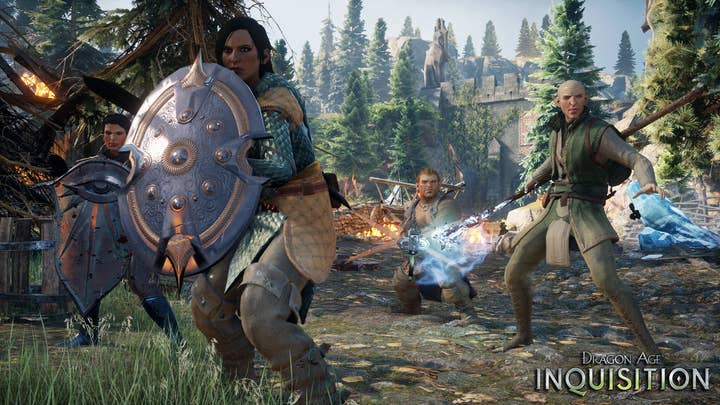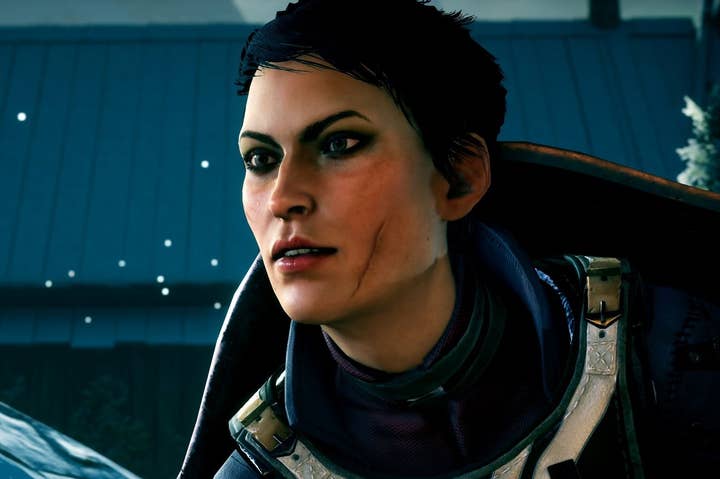What to expect from the Inquisition?
Bioware's Mark Darrah gives the heads up on the new Dragon Age
On Friday, Bioware's latest game, Dragon Age: Inquisition, went gold. As its first title on the new consoles it's an important game for the company, especially after the second Dragon Age received mixed reviews.
Luckily, from the six hours I spent wandering the Hinterlands as a giant grey warrior with gold tipped horns, battling monsters and negotiating with surly templars, the game looks set to be another Bioware success. Bigger than the previous two combined and combining the best of both, this is an RPG for the post-Skyrim audience.
Mark Darrah, executive producer on the title, explained to GamesIndustry.biz the challenges and opportunities of bringing the series to a new generation, why this installment has a multiplayer component, and Bioware's progressive approach to inclusivity.
It's a little bit of both. With Inquisition we're switching engines to the Frostbite engine and there were a lot of base level role-playing game things that don't exist in Frostbite. Frostbite doesn't really understand the idea of stats or items or saving a game, conversations, cutscenes. Like a bunch of things that we take for granted it doesn't even really conceptualize. So we've had to build a lot of that technology.

It a fresh start a certain degree, I mean this is a franchise with a long pedigree, even though it's only the third game, and draws upon Bioware's history much more deeply than the Mass Effect series does. So that always comes with certain expectations, you can only push that so far. Things like party combat, that's something that basically has been very inherent to the franchise, you can't just abandon that.
Mass Effect 1 was a project that was in some ways very similar to this one. It was a new console generation, because it was a 360 title - not a launch title but very much like this, in the first year - again using an engine that didn't really understand what a role-playing game was in the Unreal Engine.
So a lot of our plan was based upon that, but when moving generations there's always an increase in the cost of assets generation so you're always guess-timating. Last time, from the last, last-gen to what's now last gen, there was about a tripling of costs. No-one wanted that to happen this time so because of that you couldn't just say 'it's going to triple' because you didn't really have a good way to measure it.
So a lot of it comes down to just past experience and best guesses, because a lot of your planning becomes a bit obsolete and potentially even a little bit dangerous in some cases.

Skyrim changed the landscape for role-playing games completely. I mean Oblivion probably sold six million units, basically that range, Skyrim sold 20 million. So that, to some degree, changes everything.
Now the expectations of your other fans, they're changing too. People age, they typically have less time for games, so it changes their expectations in terms of gameplay segments. It also results in some nostalgia. so they may become even more firm in their attachment to previous features. Now suddenly you have 15 million people that have basically had the first RPG they've ever played as Skyrim. They have totally different expectations of what storytelling is, what exploration is, and I think exploration is really where we've seen the biggest change.
"Skyrim changed the landscape for role-playing games completely"
Games haven't been this big in ten years: Baldur's Gate II was this big, or close to this big. It's not just Bioware, really nobody was this big - games were getting smaller and smaller. I mean look at Uncharted, that's a four hour experience. There's nothing wrong with that, it's an amazingly polished four hour experience, but it's not a big experience. Whereas if you look at role-playing games from the late 90s, I mean Daggerfall is 65,000 square kilometers.
The hardware has brought back the ability to do big again and I think that's what's bringing role-playing games back to the forefront. What we've traditionally seen is that as a console generation turns over the dominant genre has changed. Shooters weren't the dominant genre a generation ago, it was racing games. If you go back before that, to the PlayStation 1 era, it was actually role-playing games. I think that's what we may be seeing here. I don't know that role-playing games will be necessarily dominant but I do think we may see open-world exploration games being the dominant genre of this generation.
Weirdly we actually had a project code-named Blackfoot which was the first game we had that was looking at Frostbite. It was a Dragon Age game, multiplayer only, that was in development before Dragon Age II came out. That became the core of what became Dragon Age Inquisition, the techlines, more than any of the development, so we've actually been looking at this a long time.
At its roots, role-playing is a multiplayer experience. It's sitting at a table with your friends and playing a pen and paper experience. It's been a single player experience on computers for a long time, but Baldur's Gate had multiplayer co-op through the story. This is an attempt to get that feeling back, something you can do, get a fantasy experience, but much more bite-size.

Ultimately it's about player choice. It's not about inclusivity for inclusivity's sake, it's about allowing as many players as possible to play the fantasy that they want to play. Whether that be having four races instead of one race, or different genders or different sexualities, these are all about letting you build and play the character that you want.
This is always a hard question to answer because it seems self evident to a certain degree that you should be doing this, so I guess it's hard…
It's much more trying to recapture some of the elements of Dragon Age: Origins. It's bigger. Bigger than Dragon Age: Origins and certainly bigger than Dragon Age II, with more deliberate combat: the combat is trying to fall between the two games. It's different in a lot of ways, if anything I think it should probably make Dragon Age: Origins and Dragon Age II feel more cohesive. It almost completes the set and makes the set make sense.
"Dragon Age II had a lot of experiments in it, some of which were very big mistakes"
Dragon Age II had a lot of experiments in it, some of which I'm glad we did but some of which were very big mistakes. Dragon Age II had some very experimental storytelling in terms of the very personal story, not a big, threatening overarching villain. I'm glad we did that but those are all very challenging from a storytelling perspective.
Dragon Age: Inquisition is due for release on November 18 on PlayStation 4, PC and Xbox One.

